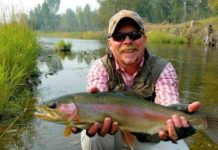Article written by Jeff Weinstein, a medical operations supervisor at Global Rescue, with 16 years of combined experience in emergency and disaster response, critical care paramedicine and emergency management. With specialty training in austere medicine and mountain rescue from The School of Medicine at UNM and Advanced Wilderness Life Support (AWLS) from the Wilderness Medical Society.
No one wakes up and says, “I’m going out to catch COVID-19 today.” Quite the opposite is true. People are vaccinating, masking, traveling to remote, outdoor areas and testing themselves as pre-cautions all the time. Unfortunately, despite all the safeguards, infrequent infections occur – and even more rarely symptoms are present. What would do if you were on vacation in a remote area, tested positive for COVID-19 and became symptomatic?
That’s what happened to Dolly Webster, a 62-year-old Montana resident who was fly fishing in The Bahamas on the island of Great Inagua. The tiny island is 375 miles/604 kilometers southeast of Nassau. It’s a paradise for fly fishing enthusiasts who are seeking tarpon, bonefish and permit.
It was Webster’s first time in the area, but her novice status didn’t diminish her fishing skills…or her luck. “I caught so many fish. It was terrific. I hooked up my first tarpon. They are amazing fish, so huge, strong and acrobatic,” she said.
Trending Now
A day before her trip ended, Webster needed to obtain a negative COVID-19 test before returning to the U.S. She had already tested negative before arriving in The Bahamas, but new travel regulations and government border rules required another set of tests before she could return.
Her test came back positive for COVID-19 despite following COVID-19 protocols to the letter: masking, physically distancing, taking part in outdoor activities like fishing and obtaining negative PCR tests before traveling to the island nation.
“I was shocked when I heard the nurse say my test was positive since I’d been so careful,” Webster said.
The news seized her with uncertainty and trepidation, and her symptoms escalated. Webster’s oxygen level was low, and her blood pressure was below the normal range. She knew COVID-19 was not a disease to take lightly. She knew the faster she could get treatment, specifically monoclonal antibody treatments to help the body fight COVID-19, the better her chances were of healthy survival.
“Every hour counts,” she said.
Regrettably, the island medical facility did not have COVID-19 therapeutic medicine and was not capable of providing adequate medical care. The nearest medical facility capable of rendering the necessary level of medical care was hundreds of miles away, but no commercial airline would allow Webster to board the plane without a negative COVID-19 test result. She was trapped with no way off the island to get to a treating hospital and no access to needed treatment from the tiny island health clinic.
“I was desperate to get off the island and get early treatment,” Webster said.
Fortunately, she had medical evacuation travel protection that included COVID-19 services. After contacting Global Rescue, the operations team acted quickly and confirmed an air ambulance for a speedy medical evacuation to Miami.
We understood the situation and the urgency for a medical evaluation. She needed a level of hospital care not available on the island so we arranged an immediate air ambulance transport to a hospital where she could receive appropriate medical care. We knew we had to get her out as soon as possible.
When she arrived at the Miami airport, Webster was transported to the hospital by a vehicle arranged by Global Rescue. She was admitted immediately, examined and began receiving monoclonal antibody treatment.
Weeks later, Webster is near full recovery and getting back to normal.
“COVID-19 is so variable in the effects it can have on a person’s health. It is a frightening disease. We can no longer travel how we used to. Our whole world has changed. Travelers now need medical evacuation protection for any trip and not just adventure trips like mountaineering, trekking, remote fishing or anything else,” Webster said.
Credit: Source link































